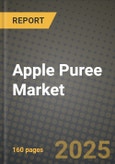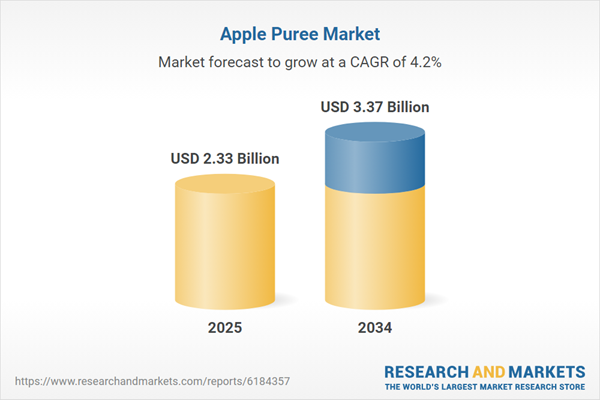Apple Puree Market
The Apple Puree Market spans aseptic, chilled, frozen, and concentrate formats used across baby food, dairy and plant-based yogurts, bakery fillings, breakfast cereals and oatmeal cups, sauces and condiments, smoothies and beverages, confectionery, and foodservice dessert bases. Supply originates from dessert apples, processing-grade fruit, and by-products from fresh-cut operations, converted via cold-break and hot-break protocols to control texture, color, and enzymatic activity. Trends emphasize clean-label formulations with no added sugar, varietal storytelling (Gala, Fuji, Honeycrisp), organic and pesticide-residue stewardship, and fiber-forward blends. Producers invest in aseptic lines for ambient logistics, enzymatic/maceration steps for targeted viscosity, and gentle deaeration to preserve aroma while minimizing browning. Blending with banana, pear, pumpkin, or berry components enables sugar reduction and seasonal SKUs; in beverages, clarified puree and NFC streams support turbidity control and stable mouthfeel. Growth is propelled by infant and toddler nutrition, school meal standards, better-for-you snacking, and bakery manufacturers seeking cost-stable fruit bases versus whole-fruit volatility. The competitive landscape includes integrated orchard-processors, specialist puree and concentrate suppliers, private-label packers, and beverage/baby brands with captive capacity; differentiation rests on year-round brix/acid balance, texture consistency across lots, micro standards, and traceability. Watchpoints include crop swings from weather, storage scald and controlled-atmosphere quality drift, enzymatic browning, flavor scalping in packaging, and tightening expectations on pesticides and sustainability. Overall, apple puree is transitioning from commodity filler to a versatile, clean-label building block that enables sugar-light reformulation, seasonal line extensions, and cost-effective fruit credentials across categories.Apple Puree Market Key Insights
- Clean-label anchor: No-added-sugar and short-ingredient lists win with parents and wellness shoppers; puree serves as a natural sweetener and binder across bakery, bars, and dairy analogues.
- Process controls texture: Cold-break preserves fresh notes and lighter color for baby food; hot-break stabilizes pectin for bakery and sauces - processors tune °Brix, viscosity, and particle size by end use.
- Varietal differentiation: Tart-sweet balance from specific cultivars improves flavor lift and lowers need for added acids; branded varietal blends support premium positioning and seasonal drops.
- Aseptic logistics scale: Shelf-stable totes and bag-in-box reduce cold-chain costs, enable global sourcing, and smooth school and QSR demand peaks with consistent micro profiles.
- Sugar reduction by design: Pairing apple with fiber-rich or tart fruits reduces perceived sweetness while maintaining body; concentrates used judiciously avoid sticky mouthfeel in RTD formats.
- Color & oxidation management: Enzyme inactivation, low-oxygen handling, and antioxidant systems mitigate browning; deaeration and protected fills preserve aroma and shelf appeal.
- Organic and residue scrutiny: Expanding organic acreage and rigorous residue testing shape procurement; identity preservation and farm-level IPM practices become selling points.
- Upcycling opportunities: Grade-out apples and peel/pomace valorization into puree bases and fibers support waste reduction narratives and cost control without compromising safety.
- Packaging matters: Barrier pouches, spout packs, and recyclable liners prevent flavor scalping and light damage; portionable formats drive lunchbox and on-the-go adoption.
- Supply resilience: Dual-hemisphere sourcing, CA storage discipline, and flexible specs (°Brix/acid windows) buffer weather-driven crop variability and pricing shocks.
Apple Puree Market Reginal Analysis
North America
Strong demand from baby food, school nutrition, and bakery drives aseptic tote usage and private-label pouches. Varietal branding and no-added-sugar cues resonate. Processors balance domestic crop cycles with imports; sustainability programs highlight upcycled inputs and recyclable spouted packs.Europe
Mature baby and yogurt markets favor organic puree, tight residue limits, and provenance storytelling. Bakery and confectionery seek hot-break textures with consistent pectin behavior. Retailers emphasize recyclable packaging and transparent farm traceability; seasonals (spice, berry blends) refresh shelves.Asia-Pacific
Rising kid snacking and beverage innovation lift demand for clarified and blended purees. Import hubs complement local harvests; lightweight pouches and multipacks suit e-commerce. Japan/Korea prioritize color stability and fine textures; Australia/New Zealand leverage orchard provenance.Middle East & Africa
Ambient-stable aseptic formats support long routes and hot climates. Growth comes from school programs, QSR desserts, and juice bars. Buyers value consistent acidity and microbiological reliability; halal labeling and multilingual packs broaden reach.South & Central America
Local orchards supply regional processors; bakery, dairy desserts, and beverage mixers lead usage. Value-priced pouches expand kids’ snacks; premium lines feature cinnamon or tropical fruit blends. Weather variability elevates interest in flexible brix windows and dual-sourcing.Apple Puree Market Segmentation
By Product
- Sweetened
- Unsweetened
By Application
- Beverages
- Ba
By Food
- Jams
- Bakery and Confectionery
- Others
By Type
- Conventional
- Organic
By Distribution Channel
- Supermarkets/ Hypermarkets
- Convenience Stores
- Specialty Stores
- Online Retail
- Others
Key Market players
Andros, Materne, AGRANA Fruit, SVZ (Royal Cosun), Döhler, Tree Top Inc., Knouse Foods (Musselman’s), Seneca Foods, Mott’s (Keurig Dr Pepper), Hero Group, Leahy-IFP, Zentis GmbH & Co. KG, Milne Fruit Products, Kiril Mischeff, Diana Food (Symrise)Apple Puree Market Analytics
The report employs rigorous tools, including Porter’s Five Forces, value chain mapping, and scenario-based modelling, to assess supply-demand dynamics. Cross-sector influences from parent, derived, and substitute markets are evaluated to identify risks and opportunities. Trade and pricing analytics provide an up-to-date view of international flows, including leading exporters, importers, and regional price trends.Macroeconomic indicators, policy frameworks such as carbon pricing and energy security strategies, and evolving consumer behaviour are considered in forecasting scenarios. Recent deal flows, partnerships, and technology innovations are incorporated to assess their impact on future market performance.
Apple Puree Market Competitive Intelligence
The competitive landscape is mapped through proprietary frameworks, profiling leading companies with details on business models, product portfolios, financial performance, and strategic initiatives. Key developments such as mergers & acquisitions, technology collaborations, investment inflows, and regional expansions are analyzed for their competitive impact. The report also identifies emerging players and innovative startups contributing to market disruption.Regional insights highlight the most promising investment destinations, regulatory landscapes, and evolving partnerships across energy and industrial corridors.
Countries Covered
- North America - Apple Puree market data and outlook to 2034
- United States
- Canada
- Mexico
- Europe - Apple Puree market data and outlook to 2034
- Germany
- United Kingdom
- France
- Italy
- Spain
- BeNeLux
- Russia
- Sweden
- Asia-Pacific - Apple Puree market data and outlook to 2034
- China
- Japan
- India
- South Korea
- Australia
- Indonesia
- Malaysia
- Vietnam
- Middle East and Africa - Apple Puree market data and outlook to 2034
- Saudi Arabia
- South Africa
- Iran
- UAE
- Egypt
- South and Central America - Apple Puree market data and outlook to 2034
- Brazil
- Argentina
- Chile
- Peru
Research Methodology
This study combines primary inputs from industry experts across the Apple Puree value chain with secondary data from associations, government publications, trade databases, and company disclosures. Proprietary modeling techniques, including data triangulation, statistical correlation, and scenario planning, are applied to deliver reliable market sizing and forecasting.Key Questions Addressed
- What is the current and forecast market size of the Apple Puree industry at global, regional, and country levels?
- Which types, applications, and technologies present the highest growth potential?
- How are supply chains adapting to geopolitical and economic shocks?
- What role do policy frameworks, trade flows, and sustainability targets play in shaping demand?
- Who are the leading players, and how are their strategies evolving in the face of global uncertainty?
- Which regional “hotspots” and customer segments will outpace the market, and what go-to-market and partnership models best support entry and expansion?
- Where are the most investable opportunities - across technology roadmaps, sustainability-linked innovation, and M&A - and what is the best segment to invest over the next 3-5 years?
Your Key Takeaways from the Apple Puree Market Report
- Global Apple Puree market size and growth projections (CAGR), 2024-2034
- Impact of Russia-Ukraine, Israel-Palestine, and Hamas conflicts on Apple Puree trade, costs, and supply chains
- Apple Puree market size, share, and outlook across 5 regions and 27 countries, 2023-2034
- Apple Puree market size, CAGR, and market share of key products, applications, and end-user verticals, 2023-2034
- Short- and long-term Apple Puree market trends, drivers, restraints, and opportunities
- Porter’s Five Forces analysis, technological developments, and Apple Puree supply chain analysis
- Apple Puree trade analysis, Apple Puree market price analysis, and Apple Puree supply/demand dynamics
- Profiles of 5 leading companies - overview, key strategies, financials, and products
- Latest Apple Puree market news and developments
Additional Support
With the purchase of this report, you will receive:- An updated PDF report and an MS Excel data workbook containing all market tables and figures for easy analysis.
- 7-day post-sale analyst support for clarifications and in-scope supplementary data, ensuring the deliverable aligns precisely with your requirements.
- Complimentary report update to incorporate the latest available data and the impact of recent market developments.
This product will be delivered within 1-3 business days.
Table of Contents
Companies Mentioned
- Andros
- Materne
- AGRANA Fruit
- SVZ (Royal Cosun)
- Döhler
- Tree Top Inc.
- Knouse Foods (Musselman’s)
- Seneca Foods
- Mott’s (Keurig Dr Pepper)
- Hero Group
- Leahy-IFP
- Zentis GmbH & Co. KG
- Milne Fruit Products
- Kiril Mischeff
- Diana Food (Symrise)
Table Information
| Report Attribute | Details |
|---|---|
| No. of Pages | 160 |
| Published | November 2025 |
| Forecast Period | 2025 - 2034 |
| Estimated Market Value ( USD | $ 2.33 Billion |
| Forecasted Market Value ( USD | $ 3.37 Billion |
| Compound Annual Growth Rate | 4.2% |
| Regions Covered | Global |
| No. of Companies Mentioned | 15 |









